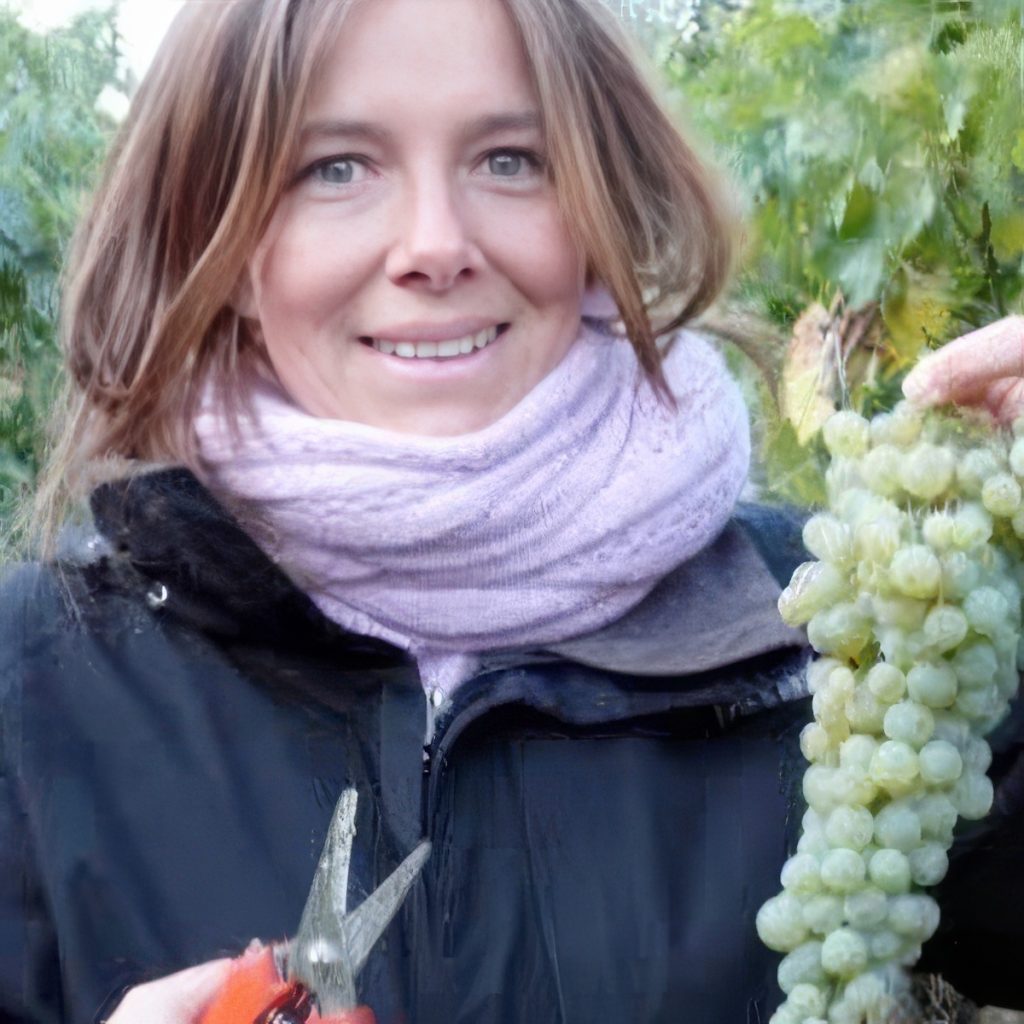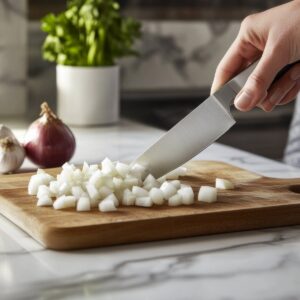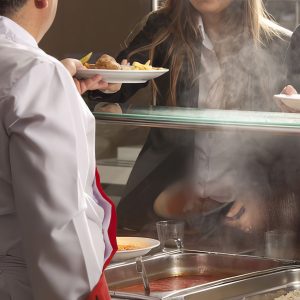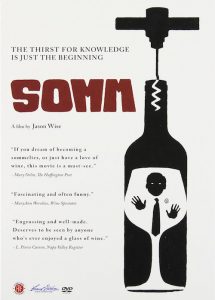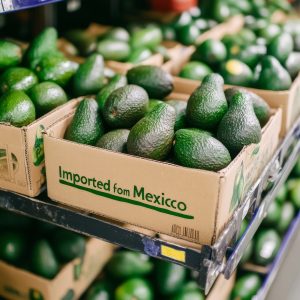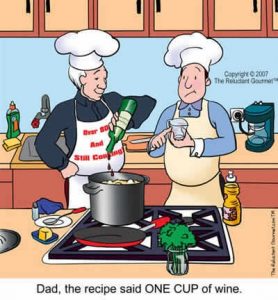Cooking is more a reason to get people together, talking, loving each other, participating in a communal activity. – Eleonora
I met Lola when she commented on my Cooking Blog about a Tuscan Tomato, Cucumber & Bread Salad called Panzanella. She is an “Italian-American, home cook, freelance writer, translator, mother, dreamer” with a wonderful food blog called Aglio, Olio & Peperoncino where she writes beautifully about Italian culture, lifestyle, and cooking.
I recently read two wonderful books on Tuscany called The Reluctant Tuscan and Under a Tuscan Sun (movie too) and am now inspired to learn everything I can about Italian cuisine and how their lives revolve around it. Lucky for us, I have met someone from Italy who can offer a glimpse of that lifestyle from first hand experience. I’m hoping Lola will write some more articles for us, offer up a few of her favorite recipes and describe to us what it is like to be an Italian home cook.
Be sure to check out her recipe for Pasta e Fagioli, one of my all time favorite Italian comfort foods.
Lola was born in the United States to an American Father and Italian mom. When her parents separated when she was three, she moved back to Rome with her mother where she was schooled in bilingual International schools. She started out in graphic design and later in the film industry as a script supervisor but has gravitated more to freelance writing about food. She has published articles in the online magazines Matador Network, Italian Notebook, and Italia Living.
Lola aims to publish her book on Italian food and lifestyle while designing custom tours and wine tasting’s and teaching cooking lessons for foreigners visiting Italy. Sounds like a great future. I’m excited to have Lola participate on the Reluctant Gourmet Novice2Pro interviews and hope you enjoy her responses as much as I have.
Hi Lola, Can we start with your name Lola? It is very unique to me, and I’m wondering if there is a story that goes with your name it.
My first nanny, a lovely and trusted gentleman from Rovigo named Natale (Christmas) called me Lola when I was my son’s age. Years later, Lola is what my two-year-old baby sister used as a simplified toddler version of my vowelly and complicated appellation; Eleonora was in fact too difficult to pronounce. She’s in her twenties now and still calls me that. Lola has just stuck with me over the years and has become my nickname. And somewhat of an alter ego.
You mentioned you moved to Rome with your mother when you were 3 years old. Do you remember when you first became interested in cooking?
Hours spent watching my skilled mother and grandmother – Nonna Titta – pottering away at the stove. I had a little wicker chair in our Rome family kitchen, and I would sit there and hold up the cookbook, reading out the ingredients and steps for the recipes to the two cookery gurus. I still have that scribbled and food-spattered book; it is one of my most precious belongings.
The smell of garlic simmering in olive oil; butter, flour, and love becoming bechamel; the feel of kneaded homemade dough for pasta; the color of bright green basil turning magically into pesto in Nonna’s marble mortar… each of these sensory events drew me inevitably to cooking. And let’s not overlook my adoration for food. I love to eat!
First, it was survival, with me sucking formula from a graded bottle. I then matured to stuffing handfuls of seafood risotto in my 2-year-old mouth. Now that I have grown into a skilled eater, I have reaped numerous satisfactions in the kitchen and generated a bad relationship with my scale. It reads oddly high numbers, especially after gastronomic epiphanies and wine tasting classes.
How old were you when you started helping your mom in the kitchen? Was it expected or just something you wanted to do? I guess what I’m asking is ….Do most Italian young girls learn to cook at a young age or does it depend on where you live or what kind of income your parents have? And does it only apply to young girls or are young boys encouraged to help in the kitchen?
I started helping out pretty soon. It was a game, it was not expected, no. That may have been a ’50s image of iconic Italian family life. Italians focus on family and tradition – sure, but the bigot concept of women forced to the stove is ancient history. Much has to do with income and geography, I’m sure.
For example, in Southern Italy, where the economy is eternally suffering, the female condition is different. But I live in a big city, and my family is very open and modern! Men involved in the kitchen is another story. We’re a little setback in that field. Only some of my Italian male friends know how to cook, and very few have learned it from their mothers.
Can you describe to us how your mom taught you how to cook? Did you start out by just watching or did she give you small tasks? Did she explain why she was doing what she was doing or let you figure it out for yourself? Did she tell you about the ingredients you were using?
My mother never needed to tell me about the significance of ingredients because shopping for them in our neighborhood farmer’s market and local butcher, fishmonger, spice vendor, etc. was a given. We’d set out with a list and return home laden with fresh seasonal goods.
I learned about the importance of quality ingredients naturally. Mom gave me small tasks in the kitchen – just like she does with my 4-year-old son nowadays. She explained why she’d perform certain actions, why you add salt to boiling water later, why you put lemon on freshly pared artichokes, etc., not in the hope of instructing me so much as that of simply sharing the knowledge. Slowly the tasks became more and more demanding, she soon delegated work in my little apartment kitchen where I was later living on my own, and then we began competing. Now she calls me for advice, which is by far the greatest compliment.
What were the most important lessons your mother taught you about cooking and the ingredients you are using?
Improvisation, good tools and wholesomeness. My mother taught me to never be rigid when it comes to reading a recipe. Add your own two cents, and substitute if it feels right. She steered clear of additives, engineered food, preservatives and ultra-packaged goods. Her golden rule was based on “Healthy Ingredients Make Cooking Easy.” That and owning a good kitchen knife and a few key pots.
When do you think you really became passionate about food? Or better yet, when do you think you realized it? Was there an ah ha moment or was it just part of your nature.
I believe it was always dormant in me, but I realized it when I cooked my first meal the day I moved out, age 22. I made roast and invited my mom over to judge it. I wrote a post about it, The Arrosto Assessment.
Did you ever think of going to culinary school to become a professional chef? If so, why didn’t you?
I love to cook, but my passions lie in the home kitchen. Keeping it simple. I like to cook for my close friends and family, not for an audience or to reap success and fame. It would be great to be a chef, or run a restaurant, or even host a cooking show, but that would mean designing a whole new career for myself.
I don’t know if I have the energy for it right now; I’m a single mother, and that’s a huge job already! And who knows, going to cooking school may be something I will do in the future, right now I’m just happy with cooking and writing about the present.
How do Italians look at the American concept (version, idea) of Italian cooking?
With some doubts. Italians are very proud of their cookery art, and rightly so. The general American simplification/standardization of Italian food is seen as a terrible shame. Of course Italy seen through American eyes, movies and books benefits from the huge tourism boost.
The American italophile ignites interest in Italy and keeps that glowing image of rustic, almost post-war feel of rural/artisan Italian lifestyle alive. Which is great, just think of what Carlo Petrini of Slow Food is doing to food! But sometimes this quaint vision is distorted according to taste .Italian cuisine and daily life overseas sometimes get adjusted to fit the taste of foreigners, and so it loses its identity.
I was recently web-hopping and I came upon a web site which instructed readers to make “Spaghetti Bolonaise” (huh? if anything it’s Bolognese, and definitely NOT spaghetti, which are a southern specialty) by baking the ragu in the oven, adding parsley and oregano with profuse abandon. Needless to say the pasta was cooked HOURS ahead of time, so the al dente concept wasn’t even remotely approached.
I wonder what people tasting that horrid concoction will feel. Is THAT their idea of a typical Italian dish? Do they know otherwise? This is of course an exaggeration, but let me assure you, there is a vast majority of the eating public which belongs to this general category. Some who never travel to Italy and taste the real local flavor will never know. They will believe Italian food is that and that alone.
There are of course genius chefs and important expat professionals working away from their native land who have elevated Italian cuisine to higher levels, but the ones who actually know where the food is coming from – its history and the work that goes into it – are few. Thankfully the web has allowed room for research and interactive dialogue between chefs, home-cooks and food enthusiasts. It’s up to us food devotees to keep that conversation cooking!
What are your favorite ingredients to cook with, why and can you give us an example of how you cook with them?
Well, have you read my blog title? (Aglio, Olio & Peperoncino) And seen the header photo? I think garlic, olive oil, a bit of spicy chili pepper, tomatoes, and basil constitute the base for many great dishes. They summarize the Italian cuisine’s simplicity, based on freshness, genuine materials, and flavor.
An example? Easiest pasta ever: in a skillet saute 2 finely chopped cloves of garlic in 3 tablespoons of olive oil, add a handful of halved cherry tomatoes, and simmer uncovered for 5 minutes. Boil the pasta al dente, drain and toss in the tomato skillet. Swoosh and stir over a vivacious flame, add a dollop of pesto or 5 leaves of fresh basil and serve piping hot.
I remember when on my honeymoon in Tuscany all the towns closed down for hours in the afternoon for lunch and I think naps too. Is that still the way of life there and what about Rome? Do they stop in the middle of the day for 2 to 3 hours to have a big lunch?
Not a huge Sunday-type meal but yes, people actually sit down and relax for lunch. Unless they’re at work, in that case they grab a sandwich or a salad or soup at their local cafe/rotisserie near the office. After the midday meal – which is the most important of the day – rhythms slow down, the pace slackens. Hence the need for an espresso jolt. Definitely naps too, we Italians take our siesta – locally called riposino – very seriously…
Is the afternoon meal the big meal of the day? If so, what do they eat at night and how is it different from what they eat in the afternoon.
Culinarily, Italy is incredibly diverse: habits, dishes, ingredients, cooking times, secrets and seasonings change radically from one region to the next. However, the basic philosophy of the meal, seen as an occasion for friends or family to gather around the table and share a relaxed interval before dashing back into the workweek melee remains consistent.
A regular weekday lunch will begin with a primo: a deep-dish plate of soup, risotto, or pasta of one sort or another. The serving size is about a cup, or perhaps slightly more, and is not intended to be a full meal. The primo will be followed by a secondo: a fish, meat, poultry, egg or vegetable-based main course with a side dish chosen to complement it. Again, portions are small plus a serving of the side dish, and bread (there must always be a basket of freshly sliced bread on the table).
Lunch will usually close with fresh seasonal fruit, and a demitasse of steaming espresso. Taken as a whole, the meal is quite balanced: carbohydrates from the first course and the bread, proteins from the first and second courses, vitamins and minerals from the vegetables and the fruit. Olive oil and the Parmigiano dairy complete the nutritional pyramid.
A festive meal such as a Sunday family get-together will be a bit more elaborate. There will likely be one or more antipasti, and there will be, in addition to fruit, cheese and some sort of dessert: either an “al cucchiaio” pudding, or store-bought pastries.
The organization of an Italian dinner can follow the same pattern as lunch, or be much lighter, like for example a bowl of soup, some fruit or a hot mug of caffellatte. Assuming you don’t decide to go for pizza, or reheating the lunch leftovers.
American’s are always looking for ways to prepare a meal in the shortest amount of time. Rachael Ray became famous for her 30 minute meals. There are dozens of cookbooks with quick recipes for those who are to busy during the week to cook. I’m guilty of it too.
We get caught up in our busy lives and commutes and there just doesn’t seem like there is enough time to prepare meals that require a lot of prep work. And that’s not to say you can’t prepare great meals in less than an hour. A saute is a great example or even a quick stir fry, but there are lots of meals that take a lot of prep and just take time.
I read your post about Friggione (tomato and onion sauce) and wonder how you find the time to make a wonderful dish like this. How to Italians work around this element of time?
There’s no guilt in quick ‘n’ easy! I’m a great advocate of it. What Italians are more concerned with is not time management, rather that the quick recipe be a solution and not an escape route.
There are chefs that encourage the use of ready-made ingredients (and I use a good Swiss bouillon cube once in a while myself) but I think it’s silly with all the wonderful ingredients and techniques at hand in Italian cuisine, to be “cheating” by preparing dishes with frozen puff pastry, or canned clams and topping a beautiful home-baked pie with whipped cream from a spray can.
Friggione is an exaggeration of that integralism. It’s a delicious sauce you make once for a special occasion, and then enjoy it the rest of your life only in Bologna restaurants, period. We don’t cook elaborate and time-consuming dishes like Friggione, or Timballo, or homemade gnocchi as a habit or every day.
Cooking complex recipes should be like a hobby: you tackle the difficult project, complete it, enjoying it and then move on to normality. The truth is the only time home cooks have the time to spend in the kitchen is on the weekend, and that’s when the bigger meals get prepared.
How is your cooking different from your moms’? Are you preparing the same recipes she taught you or have they changed with your own lifestyle and time demands?
I rely greatly on my mom’s tips and preparation directions, but in time I’ve developed my own recipes and style from her prompts. I’ve added my changes and creations to her solid palimpsest, copying them into the blank pages of the old recipe book Mamma inherited from Nonna, and which is now mine. If my son continues to show interest in cooking, he may be the next recipient of the family secrets!
Do you buy all your ingredients fresh every day, every few days, once a week?
I shop once a week for the bulk, stocking the pantry with any items that may be in shortage: pasta, salt, sugar, flour, pulse and beans, coffee, eggs, etc. Every two days I go to the neighborhood produce market (the same I went to with my mother – the vendors know me since childhood) and buy the vegetables and fruit, which in summer get consumed faster.
I visit the butcher and poultry seller at the market, and on Friday I always go to my fishmonger Mirko for some fresh catch of the day. And then every day I buy milk and bread, and a specialty cheese or some other food that inspires me – like for example, the other morning I saw Giuliana (my vegetable seller from the CSA) had prepared fresh minestrone harvested from her orto (vegetable patch).
She had pre-washed and chopped carrots, zucchini, green beans, celery, collard greens, broccoli rabe, pumpkin and tomatoes and placed them in a clear plastic bag. She weighed me an abundant kilo, gave me extra celery leaves and a small complimentary onion to throw into the pot, and charged me €2,50 ($1.88) for a complete meal!
How do you decide what you will cook? Do you plan a menu or decide when you are at the market? I read your post on Mr Massimo where you said to him “Dimmi tu” (You tell me) when he asked you what are you making. Is that typically how you cook or do you go to the market with an idea?
Depends, obviously on the occasion, but I hardly ever go grocery shopping with a menu in mind, I let the foods on display inspire me. I only buy with a purpose if I’m making something that requires ingredients I don’t normally keep in stock; and that’s a separate trip to the market. The seasons and the whim of the farmer that day decide for me!
If there were just one concept of Italian cooking you would like Americans to come away with, what would that be?
Culturally, cooking is more a reason to get people together, talking, loving each other, and participating in a communal activity. In Italy, it’s not the mere final product laid out on the table that counts or the meticulous preparation; it’s rather the entire process that leads up to it.
Smelling, admiring, and buying the ingredients. Helping with the chopping and seasoning, preparing together, setting the table and uncorking the wine in the company. Laughing, exchanging emotions, and putting life and its toils on hold for a few hours. Sitting around a table and enjoying the passage of time. Meals are not only all about food.
Lola, I’m sure I will have many, many more questions, and hope we can continue this conversation but this should be a good start. Hope you have fun with these questions.
I had a wonderful time! This was fun.

